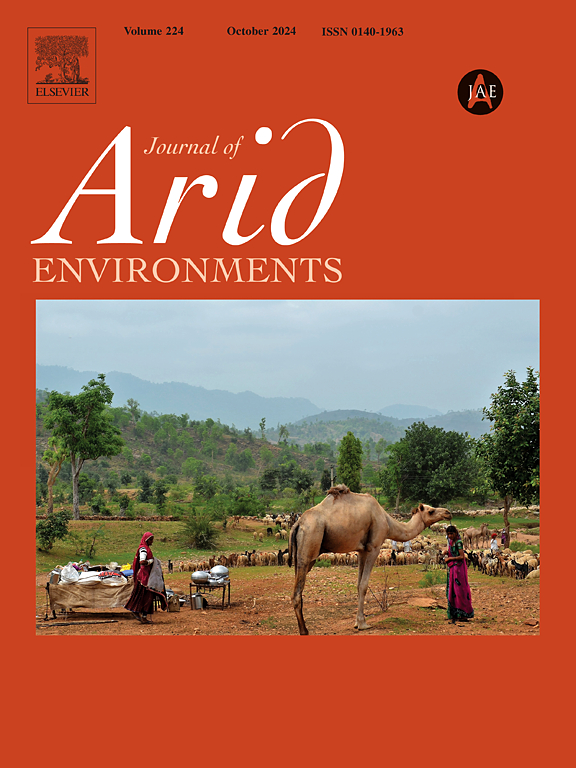土地利用/覆盖变化与地表温度之间的联系:基于遥感的十年期分析
IF 2.6
3区 环境科学与生态学
Q2 ECOLOGY
引用次数: 0
摘要
遥感(RS)数据的使用对于及时发现和监测短期和长期变化至关重要,可提供有关土地利用/覆盖(LULC)、地表温度(LST)和增强植被指数(EVI)的实时信息,并适应时空变化。本研究的主要重点是利用 MODIS 数据,评估 2001 年、2011 年和 2021 年间 LULC 变化对伊朗 Tashk-Bakhtegan 和 Maharloo(TBM)湖流域 LST 的影响。具体而言,确定了五种主要的 LULC 类别,包括:水体、牧场、耕地、城市地区和裸地。除了利用用户精度(UA)、生产者精度(PA)和卡帕系数(KC)分析 LULC 地图的准确性和过渡性外,还分析了植被覆盖度最高时 LULC、增强植被指数(EVI)和 LST 的变化以及它们之间的关系。此外,还利用邓肯检验法对这些变量进行了单因子方差分析(ANOVA)。结果表明,所有年份 LULC 地图的准确率均超过 84%。此外,耕地向牧场的转化变化最为显著,2001-2021 年间共转化了 1311.38 平方公里。整个区域的平均 EVI 几乎保持稳定,而平均 LST 则普遍上升了 0.65 °C。在所有年份中,裸地的温度始终最高,其次是城市地区。虽然经济脆弱性指数平均值没有明显变化,但所有土地利用、土地利用变化和土地利用类型的 LST 在不同年份都有明显变化。结果还表明,地表温度与植被指数之间存在持续的负相关关系,耕地的负相关关系强于牧场,2001 年、2011 年和 2021 年总面积的斯皮尔曼相关系数分别为-0.714、-0.674 和-0.623。这些研究结果对于土地规划者理解土地利用、土地利用变化和碳氢化合物变化对土地ST的影响,从而在TBM湖泊流域采取适当的策略至关重要。本文章由计算机程序翻译,如有差异,请以英文原文为准。
The Nexus between Land Use/Cover changes and Land Surface Temperature: Remote sensing based Two-Decadal Analysis
The use of Remote Sensing (RS) data is crucial for promptly detecting and monitoring changes in both short and long term, providing real time information on Land Use/Cover (LULC), Land Surface Temperature (LST), and Enhanced Vegetation Index (EVI), adapting spatio-temporal variations. The primary focus of this study is to assess the effect of LULC changes on LST in Tashk-Bakhtegan and Maharloo (TBM) lakes basin, Iran, within 2001, 2011, and 2021, using MODIS data. Specifically, five main LULC classes involving: water body, rangeland, cropland, urban area, and bareland were identified. Beside accuracy and transition of LULC maps using User Accuracy (UA), Producer Accuracy (PA), and Kappa Coefficient (KC), the analysis included changes in LULC, Enhanced Vegetation Index (EVI), and LST, as well as the relationship among them when vegetation cover was at its peak. Moreover, a one-way analysis of variance (ANOVA) test was performed to group these variables using Duncan's test. The results showed that the accuracy of LULC maps were more than 84% for all the years. Furthermore, the conversion of croplands to rangelands showed the most significant changes, with a total of 1311.38 km2 during 2001–2021. Average EVI remained almost stable across the total area, whereas average LST generally increased by 0.65 °C. Barelands consistently exhibited the highest temperatures in all the years, followed by urban areas. While no significant changes were observed in the EVI averages, significant changes were observed in the LST across all LULC classes in different years. The results also indicated a consistent negative correlation between LST and EVI, stronger in croplands than rangelands, with Spearman's correlation coefficient of −0.714, −0.674, and −0.623 over the total area in 2001, 2011, and 2021, respectively. The findings are crucial for land planners to comprehend the effects of LULC changes on LST to adopt appropriate strategies in the TBM lakes basin.
求助全文
通过发布文献求助,成功后即可免费获取论文全文。
去求助
来源期刊

Journal of Arid Environments
环境科学-环境科学
CiteScore
5.70
自引率
3.70%
发文量
144
审稿时长
55 days
期刊介绍:
The Journal of Arid Environments is an international journal publishing original scientific and technical research articles on physical, biological and cultural aspects of arid, semi-arid, and desert environments. As a forum of multi-disciplinary and interdisciplinary dialogue it addresses research on all aspects of arid environments and their past, present and future use.
 求助内容:
求助内容: 应助结果提醒方式:
应助结果提醒方式:


